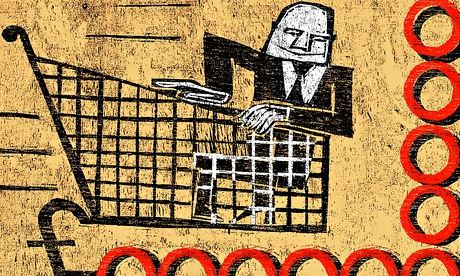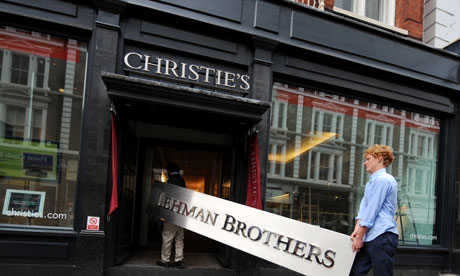Auditors are vital to the financial markets. But when they miss a catastrophe in the offing, they’re not doing their job

So the supermarket that shoved horsemeat in its burgers now admits to sprinkling horse manure on its balance sheet. That quip has been doing the rounds since Tesco confessed last week to exaggerating its profits by £250m, and it strikes at the heart of the scandal. Just as a meat patty is manufactured, so too are a set of accounts. Neither falls from the sky, or gets slung together by a solitary bloke at twilight. They are instead a huge co-production of staff, auxiliaries and quality controllers, and they reflect the culture of the environment in which they are assembled.
Conversely, whoppers as large as the one Tesco has been caught telling won’t suddenly have popped out of the mouths of a mere handful of managers. Profits forecast for the biggest of FTSE 100 retailers will have been chalked up by advisers working to standard company practice, sweated over by executives and signed off at top levels of the company. Yet the result, according to new chief executive, Dave Lewis, is the kind of accounting he hasn’t seen during 27 years in business.
The horsemeat disgrace exposed a systemic dysfunction in capitalism: the abuse of suppliers by all-powerful supermarkets resulting in dinners that families couldn’t trust. Last week’s accounting scandal opens the door on another systemic breakdown: how one of those same giant businesses, struggling to pep up a flagging stock price, produced numbers that the business world couldn’t believe.
For understandable reasons, the press has largely spun this as the latest episode in the downfall of Tesco. Who wouldn’t tell that story? It’s simpler, starker and focuses on a high-street institution – what could be more satisfying than a tale of hubris at one Britain’s last remaining world-leading companies, especially if it allows a moist recollection of former Tesco boss Terry Leahy, one of the country’s dwindling number of business people of international repute.
But then awkward questions arise that force us to pull back the frame. The one that foxes me: where were Tesco’s auditors in all this? PwC is one of the Big Four accountancy firms who between them carry out around 90% of all audits for FTSE 350 companies. The £2.7bn-turnover partnership went over Tesco’s accounts for the 12 months to February this year, and gave the supermarket chain a clean audit in May. Just a few weeks later, on 29 August, Tesco executives issued their now infamous forecast – the one that exaggerated their likely profits by 25%.
You can imagine that in the course of a not-so-balmy summer, one of Europe’s biggest businesses suddenly went off its collective trolley and put out a confected set of figures – which, let me emphasise, were not checked over by its auditors. But consider this: back in May, PwC plainly was not entirely comfortable with the numbers it was signing off for Tesco. It went so far as to note its concern over commercial income – the fees paid by suppliers for Tesco giving their products prominence within their stores, and the income overstated in August by the supermarket chain.
On page 66 of the annual report, the auditors note that “commercial income is material to the income statement and amounts accrued at the year end are judgmental. We focused on this area because of the judgment required in accounting for the commercial income deals and the risk of manipulation of these balances.” In the polite, formulaic world of company reporting, this is a warning klaxon. And yet the auditors then went on to list the measures they’d taken to allay their concerns – and to sign off the numbers.
PwC has been Tesco’s auditor for over 30 years. For that service, Tesco paid PwC £10.4m in the last financial year – plus another £3.6m for other consultancy work. Of the 10 directors on the supermarket’s board (leaving aside the chief executive and the chief financial officer, both of whom are relatively new), two are ex-PwC: Mark Armour, a non-executive director, and Ken Hanna, chair of the company’s own audit committee.
Now imagine yourself as a senior executive at Tesco. The business has never been the same since Leahy left. The slump has dampened consumer spirits, some of the company’s foreign adventures now look ill-judged, and Aldi and Lidl are eyeing up your customers. And your remuneration partly depends on the share price – which is listing, badly. How and when to count commercial income is already one of the greyest of grey areas in accounting. Why wouldn’t you be a bit more “aggressive” in your forecasting?
To be clear, we don’t know that anything like this happened – yet it’s exactly to avoid such suspicions arising that we have auditors. This is why the government demands the vast bulk of limited companies (and hospitals and charities) have their accounts audited.
Just as with credit-rating agencies, auditing is a necessary part of the financial markets – but the auditors are paid by the very companies they are judging. Just as with S&P and Moodys, they form a small but powerful “oligopoly” – what was once the Big Eight shrank to the Big Five and, after the Andersen debacle at Enron, to the Big Four. And just as with the credit-raters, the result is often so unsatisfactory as to be useless.
All those banks that collapsed in the crisis were signed off as perfectly sound by PwC and its fellow auditors. But then, as Jeff Skilling, chief exective of Enron, said in 2004: “Show me one fucking transaction that the accountants and the attorneys didn’t sign off on.”
Nor was that a one-off lapse: in May this year, the regulators at the Financial Reporting Council noted that PwC audits, while generally of “a good standard”, were also too accepting of management fudge. As Prem Sikka, professor of accounting at the University of Essex, argues: “If some used car dealer was engaged in a fraction of the shortcomings, warnings and scams that big accountancy firms have been involved in, he would be put out of business.”
For their part, accountants are often aware of their industry’s shortcomings. For his book Accountants’ Truth: Knowledge and Ethics in the Financial World, Matthew Gill interviewed 20 young accountants at the Big Four firms. He found a bunch of men well aware of the boredom of the audit and of the shortcuts they were forced to make.
Some defended what they did. One told him: “I don’t think there’s anything unprofessional in giving views of facts directed by whoever it should be.” Another described his discomfort at working in his firm’s corporate-finance department and supporting what he described as “immoral” and “borderline corrupt” tax wheezes. But rather than voice his qualms, he simply moved department. Whistleblowing was not for him: “I would have felt I would look slightly ridiculous.”
Read that last sentence and recall that the person who blew the whistle this month on Tesco wasn’t the company’s audit committee or ethics committee – and they don’t appear to be from PwC either. As far as we know, the anonymous whistleblower worked for Tesco’s UK finance director, Carl Rogberg, and their report was at first ignored.
When last week’s scandal broke, Tesco chair Sir Richard Broadbent airily opined: “Things are always unnoticed until they are noticed.” He forgot to mention that that goes double if people are paid to turn a blind eye.




 Comment
Comment
